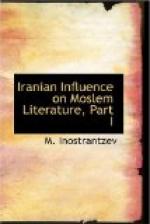[Sidenote: Dinawari.]
As the most important of extant Arabic representations of the Khoday-Nameh and the cognate literature we must regard at any rate Tabari I have already touched upon Eutychius, Ibn Kotaiba, and Yakubi. Another old chronicler Abu Hanifa Ahmed bin Daud Dinawari greatly accords with Tabari but presents also much that is peculiar to himself. A closer examination would no doubt reveal that he draws considerably upon romances directly or indirectly and that he is not particularly accurate. Tabari reproduces the conflicting versions of the same incident separately one after another; Dinawari works them up into a single unified narrative.
[Sidenote: Hamza.]
The small book which Hamza Ispahani wrote in 961, contains in brief much independent information on the Sasanides. Hamza treats his materials in a spirit of much more freedom and independence than Tabari, but to us the compiling process of Tabari is far more convenient.
[Sidenote: Masudi.]
Masudi in his “Meadows of Gold” affords us many a supplement to Tabari’s narratives derived from reliable Persian sources. But Masudi works very unequally, accepts a good deal that is suspicious provided only it is entertaining, and as regards detail he is by no means over exact.
As an historical authority, the Persian redaction of Tabari, so remarkable in many of its aspects, and achieved by Muhammad Belami or by others under his guidance, has but little value. I designate this work as “Persian Tabari” and have used it in the splendid Gotha manuscript and in Zotenberg’s French translation. I have also consulted the Turkish version of Belami in a Gotha Manuscript.
[Sidenote: Tabari more valuable than Firdausi.]
All these writers and others present us collectively a tolerably rich and vivid portrait of Persian tradition of the Sasanide times. But the best comprehensive statement of the story of the Sasanides on the basis of this tradition is furnished us by Tabari, all his shortcomings notwithstanding and despite the pre-eminence which Firdausi’s poem possesses as such.
[Sidenote: Ibn Kelbi.]
But in his narrative of this period Tabari had laid under contribution reports which were not of Persian origin. For the history of the Arab princes of Hira, which is so intimately related to that of the Persian empire, Tabari’s chief authority was Hisham bin Muhammad called Ibn Kelbi a man who, like his father Muhammad bin Saib Kelbi before him, has rendered, however often modern criticism may take exception to the unscientific system of both the writers, the greatest service in connection with the collection of the scattered information on the history of ancient Arabs. We know of a few of the numerous writings, large and small, of Ibn Kelbi which are enumerated for us in the Fihrist and which probably are at the root of Tabari’s chapters. It is quite possible that Tabari borrows many of the secondary




